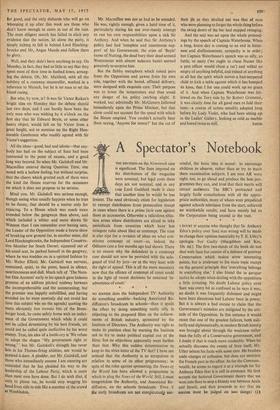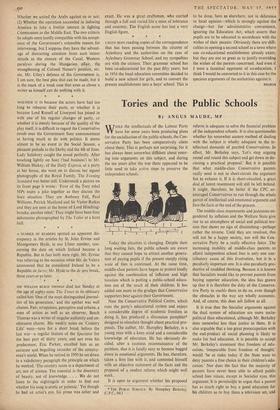DOUBT IF anyone who thought that Sir Anthony Eden's policy
over Suez was wrong will be made to change their opinion materially by T. E. Utley's apologia Not Guilty (Macgibbon and Kee, 10s. 6d.). The first two-thirds of the book do not deal with Suez but consist of a defence of postwar Conservatism which makes some interesting points, but is irrelevant to his main topic except on the general principle that 'everything belongs. to everything else.' I also found the tu quoque tactics he adopts when dealing with the opposition a little irritating. No doubt Labour policy over Suez was every bit as confused as he says it was no doubt it was frequently dishonest and might have been disastrous had Labour been in power. But it is always a bad excuse to claim that the Government's mistakes are mitigated by the atti- tude of the Opposition. In this instance it would mean that one of the greatest failures, both mili- tarily and diplomatically, in modern British history was brought about through the weakness rather than the folly of a Conservative government, and I doubt if that is much more creditable. When he actually discusses the events of Suez itself, Mr. Utley selects his facts with some care. He brushes aside charges of collusion, but does not mention the French part in the affair. As for the Common- wealth, he seems to regard it as a triumph for Sir Anthony Eden that it is still in existence. He first accepts the battered Government theory that we went into Suez to stop a bloody war between Arab and Israeli, and then proceeds to say that its success must be judged on two things: (I') Whether we united the Arabs against us or not; (2) Whether the operation succeeded in inducing America to take a livelier interest in fighting Communism in the Middle East. The two criteria he adopts seem hardly compatible with his accept- ance of the Government's ostensible reason for intervening; but I suppose they have the advant- age of distracting attention from such 'minor details as the closure of the Canal, Western paralysis during the Hungarian affair, the strengthening of Colonel Nasser's position, etc. etc. Mr. Utley's defence of the Government is, I am sure, the best plea that can be made, but it is the mark of a weak case that even as clever a writer as himself can do nothing with it.



































 Previous page
Previous page